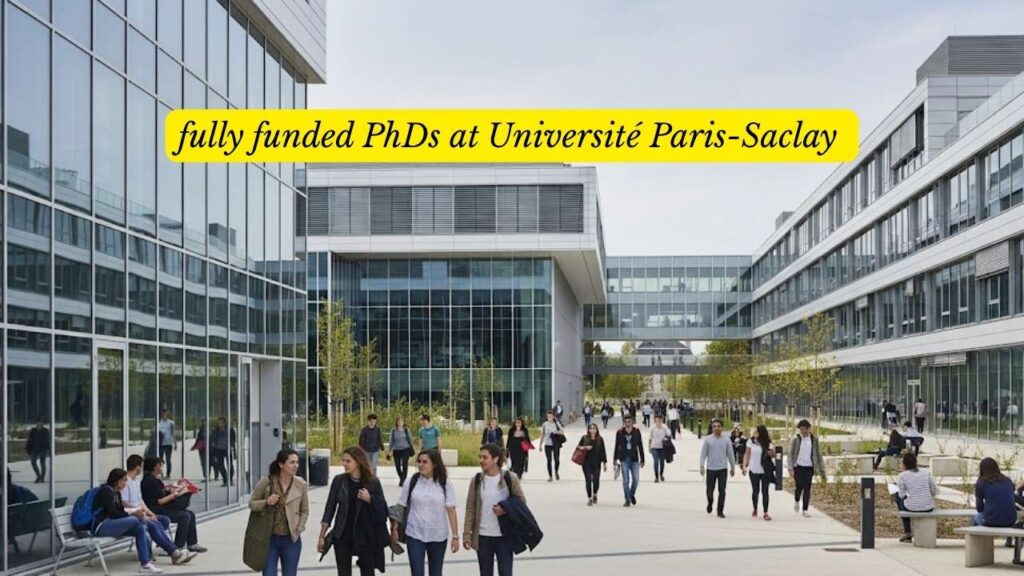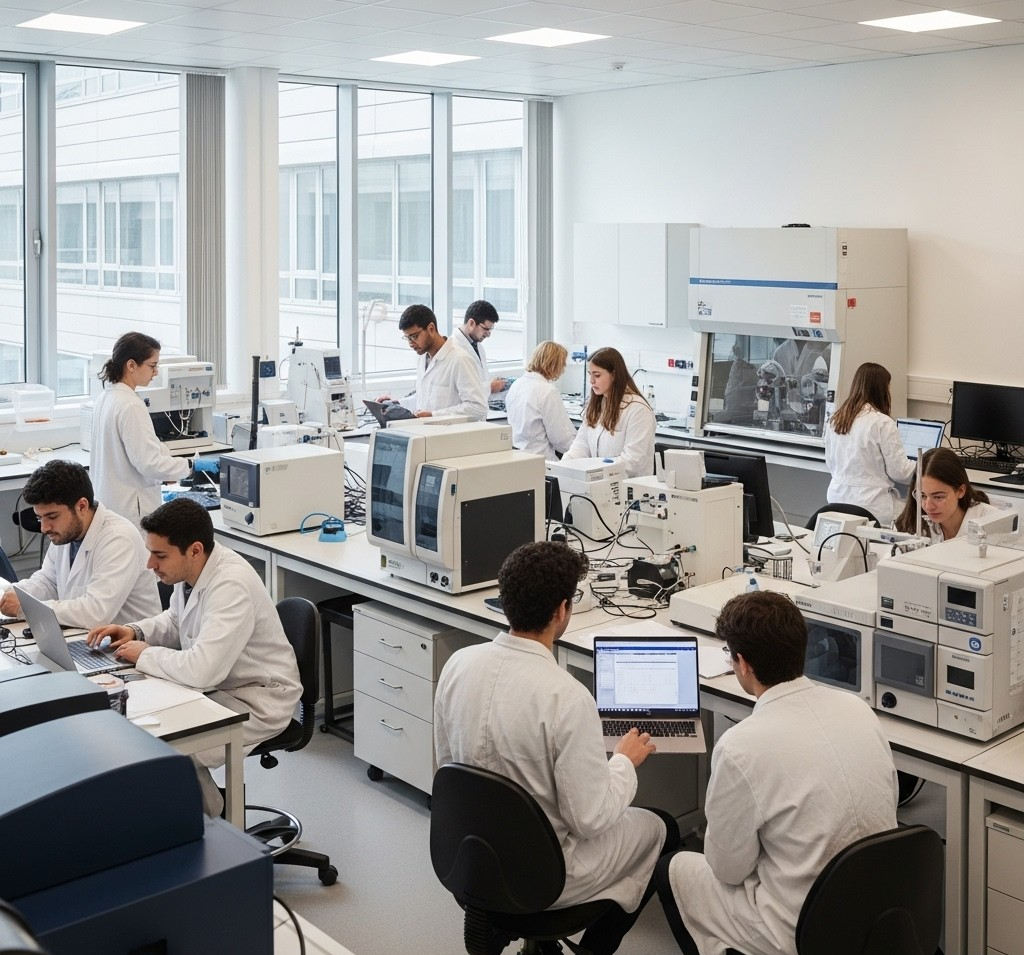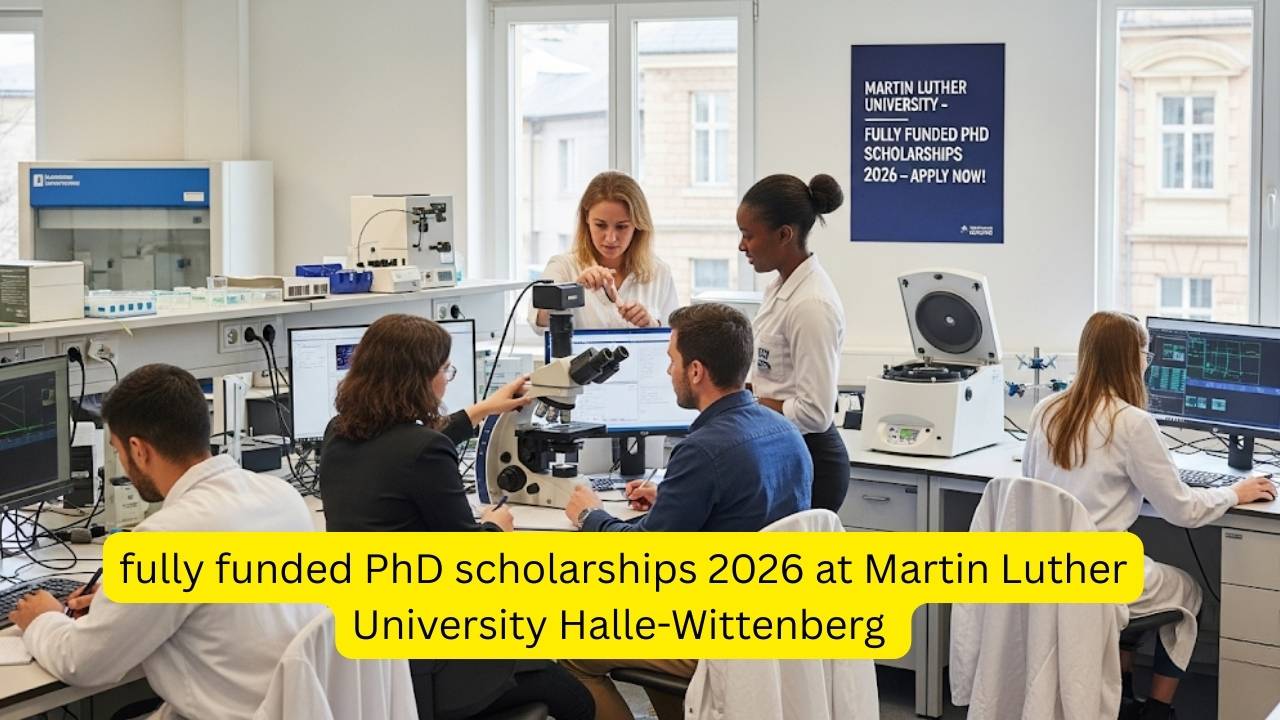Embarking on a PhD is a transformative journey, and for many aspiring researchers, the question of funding is paramount. If you’re dreaming of cutting-edge research in a vibrant academic environment, fully funded PhDs at Université Paris-Saclay in 2025 present an incredible opportunity. This article is your comprehensive guide, designed to illuminate the path to securing a prestigious doctoral position at one of Europe’s leading institutions, offering not just academic excellence but also the financial support to truly thrive.

The Allure of Université Paris-Saclay: A Hub of Innovation
Université Paris-Saclay stands as a beacon of research and higher education, consolidating the strengths of numerous universities, Grandes Écoles, and research organizations. It’s a place where groundbreaking discoveries are made, and future leaders are forged. The university’s commitment to internationalization is evident in its diverse student body and a strong emphasis on international collaborations, including highly sought-after cotutelle programs.
From my experience advising countless students, one common thread among successful applicants to institutions like Paris-Saclay is a clear understanding of the university’s research landscape and a genuine alignment with its scientific ambitions. It’s not just about getting in; it’s about finding your intellectual home. How to apply for PhD | Université Paris-Saclay
Why Choose a PhD at Paris-Saclay?
- World-Class Research Environment: Access to state-of-the-art facilities and a vast network of highly reputable researchers across a multitude of disciplines.
- Interdisciplinary Approach: Opportunities to collaborate across various fields, fostering innovative and impactful research projects.
- Strong Doctoral Schools: A well-structured doctoral program with dedicated support from over 20 doctoral schools covering a wide array of subjects, from hard sciences to humanities.
- International Focus: Programs designed to encourage international collaboration and mobility, including joint doctoral degrees.
- Path to a European Doctorate Label: Opportunities to enhance your PhD with the “European Doctorate” label, recognizing international mobility and collaboration.
Navigating Funding Opportunities for Your PhD
Securing a fully funded PhD at Université Paris-Saclay means your tuition fees, and often a living allowance, are covered, allowing you to focus entirely on your research. While competition can be strong, the university and various external bodies offer several avenues for financial support.
Key Funding Mechanisms
Université Paris-Saclay emphasizes that PhD students often hold an employment contract, granting them a salaried status. This is a significant advantage, providing a stable income during your doctoral studies.
- Doctoral Contracts (Contrats Doctoraux): These are the most common form of funding, typically awarded through competitive processes within the doctoral schools. These contracts usually last for three years and provide a monthly salary. They often include opportunities for supplementary activities like teaching. Doctoral schools | Université Paris-Saclay
- International Doctoral Cotutelle Funding Programme (ADI): For students pursuing a joint doctoral degree with a partner institution abroad, this program provides financial support. The application process for the 2025-2026 academic year involves thesis subject submission (January 15 to February 23, 2025) and student applications (February 28 to March 31, 2025). This is an excellent route for those seeking an international research experience.
- CIFRE (Conventions Industrielles de Formation par la Recherche): These are industrial research training agreements, allowing PhD candidates to work on a research project in collaboration with a company while being employed by that company. This offers a unique blend of academic research and industry experience.
- Eiffel Scholarship Program of Excellence: This prestigious scholarship, funded by the French Ministry for Europe and Foreign Affairs, aims to attract top international students to Master’s and PhD programs in France. Université Paris-Saclay supports and submits applications for eligible candidates. For PhD level, the scholarship can range from 12 to 36 months, with a monthly allowance of approximately €1,800. Eligibility criteria typically include age limits and specific fields of study (Sciences and Techniques, Human and Social Sciences).
- External Scholarships and Grants: Many other organizations, foundations, and governments offer scholarships for international students pursuing PhDs in France. Websites like Campus France’s Campus Bourses tool are invaluable resources for discovering these opportunities.

The Application Process: Fully Funded PhDs at Université Paris-Saclay in 2025 Guide
The application process for a PhD at Université Paris-Saclay is meticulous but straightforward. The key is to be organized and proactive.
1. Identify Your Research Interest and Supervisor
This is arguably the most crucial step. A PhD is fundamentally a research project, and finding a supervisor whose work aligns with your interests is paramount.
- Explore Doctoral Schools: Université Paris-Saclay has numerous doctoral schools, each covering specific scientific domains. Explore the list of doctoral schools on the Université Paris-Saclay website to find those relevant to your field. Examples include:
- Agriculture Food Biology Environment Health
- Electrical, Optical, Bio-Physics and Engineering (EOBE)
- Hadamard Doctoral School of Mathematics
- Sciences and Technologies of Information and Communication (STIC)
- Mechanical and Energy Sciences, Materials and Geosciences (SMEMAG)
- Find Thesis Subjects and Supervisors: Research potential thesis subjects and supervisors through the university’s ADUM platform and the individual doctoral school websites. Many supervisors publish specific PhD topics they are looking to fund.
- Reach Out to Potential Supervisors: Once you identify a potential supervisor, craft a concise and compelling email expressing your interest in their research and attaching your CV. This initial contact is vital for establishing a connection and discussing potential projects. In my experience, a well-researched and personalized email can make all the difference.
2. Prepare Your Application Documents
While specific requirements may vary by doctoral school, common documents include:
- Master’s Degree (or equivalent): A strong academic record at the Master’s level is essential.
- Curriculum Vitae (CV): Highlight your research experience, publications (if any), academic achievements, and relevant skills.
- Motivation Letter/Research Proposal: A compelling letter outlining your research interests, why you want to pursue a PhD at Paris-Saclay, and how your background prepares you for doctoral-level research. If you’ve discussed a specific project with a supervisor, incorporate that.
- Academic Transcripts: Official transcripts of your previous academic degrees.
- Letters of Recommendation: Typically two or three letters from academic referees who can attest to your research potential and academic abilities.
- Language Proficiency: Proof of English proficiency (e.g., IELTS, TOEFL) or French proficiency, depending on the program’s language of instruction. While many programs are in English, French proficiency can be a significant advantage for daily life and integration.
- Copy of Passport/ID.
3. Submit Your Application
Applications are typically submitted through the ADUM platform, the dedicated portal for doctoral student applications at Université Paris-Saclay.
- Create an ADUM Account: This platform will be your central hub for submitting documents and tracking your application.
- Follow Doctoral School Specific Procedures: Each doctoral school may have slightly different application procedures and deadlines. Always consult the specific doctoral school’s website for precise instructions.
- Secure Supervisor and Research Unit Approval: Your application generally requires favorable recommendations from both your prospective thesis supervisor and the director of the research unit you plan to join.

Important Dates for 2025 Admissions
While specific deadlines vary by program and funding opportunity, here are some general timelines to keep in mind:
- ADI Cotutelle Program:
- Thesis Subject Submission: January 15 – February 23, 2025
- Student Applications: February 28 – March 31, 2025
- Doctoral School Opinions: By May 15, 2025
- Selection Committee Evaluation: 3rd week of June 2025
- Eiffel Scholarship: Applications are typically submitted by the university on behalf of the candidate, usually with internal university deadlines falling well before the Campus France deadline (often in December/January for the following academic year).
Life as a PhD Student in Paris-Saclay
Beyond academics, understanding the cost of living and student support services is crucial for a successful PhD journey. While Paris itself is known for being expensive, the Paris-Saclay cluster, located south of Paris, offers a slightly more manageable cost of living compared to the city center.
- Accommodation: Université Paris-Saclay provides support and resources for finding housing, including student residences (CROUS dorms, which are highly sought after) and private accommodation. Expect monthly rent for a shared apartment to be in the range of €450-€750, or a private studio between €700-€900.
- Cost of Living (Estimated Monthly):
- Rent: €450-€900 (depending on type and location)
- Utilities: €100-€170
- Groceries: €220-€380
- Public Transport (Student Pass): €30-€80 (e.g., RER annual pass around €375)
- Health Insurance: €25-€50 (mandatory for students)
- Miscellaneous/Entertainment: €80-€200
- Total Estimated Monthly Cost: €800-€1,400
These figures highlight why a fully funded PhD at Université Paris-Saclay is so valuable, as it significantly alleviates the financial burden.
Your Ultimate Guide to the UNSW Women in Engineering Scholarship 2026
FAQ
Q1: What are the general eligibility criteria for a PhD at Université Paris-Saclay?
A1: Generally, you need a Master’s degree (or equivalent), a strong academic record, and a defined research project with a prospective supervisor. Language proficiency (English or French) is also required.
Q2: How competitive are the fully funded PhD positions?
A2: Fully funded positions are highly competitive, reflecting the university’s prestige. Strong academic performance, a compelling research proposal, and relevant research experience significantly enhance your application.
Q3: Can I apply for a PhD if I don’t have a supervisor already?
A3: While some programs might allow initial applications without a supervisor, it is highly recommended and often a prerequisite to establish contact with a potential supervisor before applying to a doctoral school. Many doctoral schools require a favorable recommendation from a supervisor for your application to be considered complete.
Q4: Are there opportunities for part-time work during a fully funded PhD?
A4: Doctoral contracts often include possibilities for additional responsibilities like teaching (up to a certain number of hours), which can provide supplementary income. However, the primary focus of a fully funded PhD is your research.
Q5: What is the “European Doctorate” label, and how can I obtain it?
A5: The “European Doctorate” label is an additional recognition awarded to your national doctoral diploma. To obtain it, you typically need to spend at least three months within a European Union country during your PhD and have at least two international reviewers for your thesis. Université Paris-Saclay supports students in achieving this label through its EUGLOH alliance opportunities.










